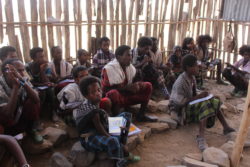Inclusive Education Institutions
Access to effective governance and justice structures is important. Our research investigates and promote education institutions and systems that recognise and value everybody’s rights, everybody’s situation and everybody’s needs. This means balancing responsibility with rights, as well as creating mechanisms which address power imbalances between those who hold positions of power and control, and those who do not. We believe that understanding of particular contexts is critical and our current work focuses particularly on India through the RAISE and P2N projects.
Our research invests the effort in understanding what people need, what their aspirations are and how inclusive institutions can best respond.
Our 2017 study commissioned by GIZ/BMZ and Educate A Child shows a number of challenges in providing education for children from mobile populations.
Read more about how nomadic groups are highly discriminated against in access to education and our research on evolving approaches to educating children from nomadic communities.
Work with the Government of Kenya and IIED shows that moving from a tactical approach to a strategic approach can better help meet the challenges of providing education to nomadic populations.
 Our background paper for the 2015 Education for All Global Monitoring Report highlights approaches to educating children from mobile and nomadic communities.
Our background paper for the 2015 Education for All Global Monitoring Report highlights approaches to educating children from mobile and nomadic communities.
Read our 4* 2014 REF case study on how redesigning education services enabled nomadic pastoralists’ inclusion in the global Education For All movement.
